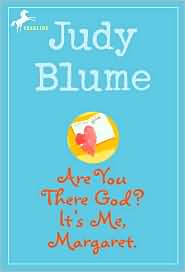Hush by Eishes Chayil (09.14.2010, Walker Books)
Guest Review by Kelly Lucas
About four months ago (mid-July for those who can’t do math like me), my supervisor at Bloomsbury USA* handed me the ARC of Hush by Eishes Chayil and said, “You have to read this book.” All I knew about Hush was that it was a story about a Chassidic Jewish girl in Brooklyn, and that Eishes Chayil was also a Chassidic Jewish woman. The cover and the title also leave little to the imagination: a young woman a is being hushed with a finger to her lips. It was not hard for me to put together that I was about to take a very in depth and emotional journey into a community that a few people know a little about. I began the book immediately on the train ride home, and finished it three days later.
Now that Hush has been released and you can find it in bookstores nationwide, I’m telling you: You have to read this book. Hush is a unique look into the Chassidic community; one that I’ve never seen before in other books or on television. Chassidic Jews value a strong community setting and this can lead to more isolationist tendencies. They have their own temples and schools in their community and it’s harder to get out than it is to get in. Going against this community is considered a sin because the Torah states that one should never say anything bad about another Jew.
Eishes’s voice is shockingly real. In the very beginning Gittel, the main character and narrator, describes to the reader that her community is the best community of all; that they are better than all the other Chassidic Jews, and are especially better than other conservative or reform Jews. At first this disturbed me, but I realized that Gittel, and Eishes, didn’t know any different. Hush must be read with the acknowledgement that Gittel and the people in her community were raised to think in this way about themselves and other Jews. However, this does not mean that all Chassidic communities or other Jewish communities have this mentality. This is one tragic case that is, unfortunately, based on a true story.
The semi-autobiographical story is told in two parts: in 2003, when Gittel is ten, and in 2010, when Gittel is seventeen going on eighteen. The two voices created in this time-split narration are surprisingly believable. Ten-year-old Gittel has an innocence that comes through in her speech. When a tragedy occurs, she becomes confused as everything is hushed and ignored by the community and she doesn’t know how to handle it except by following their lead. Seventeen-year-old Gittel has become a young woman going through the process of engagement and marriage, but is harboring a pain she needs answers to-- except, she can’t get them. The her own parents and the community continues to hush her and ignore the problem.
I’m obviously not going to tell you what the tragedy is, Eishes’s storytelling is too powerful for it to be ruined** - so DON’T read any summaries online and avoid the description on Amazon***. Hush is one of those books where you laugh, cry, and want more at the end. I loved turning page after page, learning more about Gittel’s story and the Chassidism’s traditions. She takes you through Passover, Purim (my personal favorite Jewish holiday), Channukah and so much more. You even learn why Eishes chose her pseudonym (yes, it’s a pseudonym). “Eishes Chayil” means “woman of valor” and she truly is one. I don’t know what would happen if her community found out she wrote this, but it would not be good. The issue Eishes discusses is powerful and important and one I greatly care about-- which is why I chose this book in particular. Gittel, also a woman of valor, learns that it is important to stand up and fight, and not remain silent.
Eishes could not remain hushed and spoke, or rather wrote, out. I am following in their footsteps and speaking out too.**** No one’s going to tell me to hush, and no one should tell you either. So, for Eishes Chayil, Gittel, and everyone who is effected in the real life story, go read Hush. Speak out with us.
End Notes:
*I was fortunate enough to be an intern in the Marketing/Sales department this past summer at Bloomsbury US (which is how I came to enable Laura with her ARC of The Mockingbirds).
**I cried when I found out. I cried about four different times throughout the book. THAT’S how awesome this is.
***Seriously, I didn’t know and it was....magical. Too many emotions ran through me to even describe.
****Actually, I’m very active in speaking out, but we’re going to ignore that for right now.





